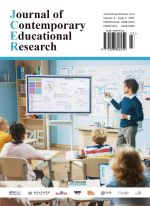Abstract
As a crucial vehicle for young children’s artistic enlightenment, music appreciation holds an irreplaceable value in cognitive development, emotional edification, and the cultivation of aesthetic abilities. Currently, in music appreciation activities for senior kindergarten classes, there is a widespread phenomenon of homogenized teaching content and mechanized teaching methods, which results in insufficient enthusiasm for participation among young children and a superficial understanding of music. The situational teaching method, by constructing concrete and immersive learning scenarios, can effectively activate young children’s multi-dimensional sensory experiences. Its characteristics of intuitiveness and interactivity are highly consistent with the traits of young children’s concrete thinking, thus providing a new approach to resolving the current predicament. The research focuses on the practical pain points in music appreciation activities for senior kindergarten classes and proposes targeted solutions from four dimensions: content design, method innovation, resource integration, and teacher training, aiming to reconstruct a child-centered, in-depth music learning model. Practice has shown that the situational teaching method can not only enhance young children’s perceptual sensitivity to musical elements but also guide them to achieve emotional resonance through role-playing and life-related associations, laying a foundation for the sustainable development of young children’s musical literacy.
References
Ng SC, Bull R, 2018, Facilitating Social Emotional Learning in Kindergarten Classrooms: Situational Factors and Teachers’ Strategies. International Journal of Early Childhood, 50(3): 335–352.
Rahmah N, 2019, The Use of Jazz Chant Technique for Teaching Pronunciation at The Second Year Students of SMPN 4 Model Parepare (Classroom Action Research), dissertation, IAIN Parepare, 12–14.
Williams AMW, 2013, An Action Research Study Using the MUSIC Model of Academic Motivation to Increase Reading Motivation in an Elementary Classroom, dissertation, Virginia Polytechnic Institute and State University, 9–12.
Lin Z, Devarajoo K, 2021, The Strategies of Teaching Basic Piano Courses for Preschool Education Major in China. International Journal of Infrastructure Research and Management, 9(2): 11.
Bai J, 2022, RETRACTED: Optimized Piano Music Education Model Based on Multimodal Information Fusion for Emotion Recognition in Multimedia Video Networks. Mobile Information Systems, 2022(1): 1882739.
Li Y, 2023, Action Research on Music Appreciation Activities in Large Kindergarten Classes Based on Situational Teaching Method, dissertation, Southwest University.
Zhao M, 2025, Research on the Teaching Mode in the Field of Experience and Appreciation of Music Lessons in Primary and Secondary Schools, dissertation, Northeastern Normal University.
Gu X, 2021, Action Research on the Independent Improvement of Teachers’ Teaching Literacy in Primary School Music Appreciation Class. Literary Youth, (19): 0051.
Zhang M, 2025, Research on the Application of Local Resources in the Art Teaching Activities of Mixed Classes for Young Children, dissertation, Hunan Normal University.
Zhang M, 2014, Research on the Application of Local Resources in Mixed Classes——Class M of Class A Kindergarten, Meijiang Town, Xiushan County, Chongqing as an Example, dissertation, Hunan Normal University.
